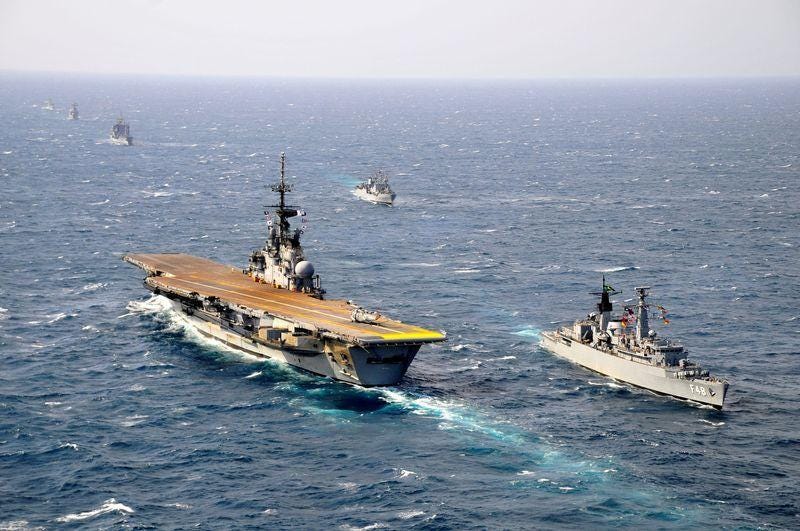This newsletter looks at issues and events from the endgame point of view. The endgame is a chess concept. In the endgame only a handful of pieces are left on the board. Few moves remain. Victory or defeat is close. Player options are limited and diminishing. Zugzwang is a particularly important aspect of the endgame. It is zugzwang when a player’s only available moves will worsen his position.
Toronto, February 12, 2023
São Paulo
Forget the Chinese spy balloon.
If you want to talk military hardware, let’s talk about Brazil’s aircraft carrier São Paulo, the aircraft carrier that nobody wanted.
São Paulo, 33,000 tons and 873 feet long, was built by France in the late 1950’s (the French christened it Foch). Its normal complement of crew was almost 2000 and it carried 22 jets and 17 helicopters. Brazil bought the carrier in 2000, gave it a new name, and made it the flagship of the Brazilian navy.
That didn’t work out too well for the Brazilians. It turned out São Paulo was a floating piece of junk, just like the four rubbishy second-hand submarines that Canada bought from the United Kingdom in 1998. A UK Member of Parliament said later that the UK/Canada submarine sale was a “daft deal” and that Canada should ask for a refund. Said the MP: “‘Buyer beware' should have been painted on the sides of these submarines... It's either incompetence on behalf of the Canadians, or sheer, smooth-talking salesmen from the MOD [Ministry of Defence] here in Britain." (Note to file: Don’t buy used warships, particularly from the French or the Brits.)
São Paulo was decommissioned in 2017. The Brazilian government sold it for scrap to a Turkish company. The price was a paltry US$2 million, considerably less than the base price of a new Lamborghini Countach.
In August 2022 an attempt was made by the new owner to tow São Paulo to Turkey for recycling, but the Turkish government refused permission for the ship to dock. The São Paulo was an environmental timebomb: it had been packed with asbestos when it was built and after decommissioning had filled up with dangerous gases. Under tow, it turned around at Gibraltar and headed back to Brazil. The Brazilian government followed the lead of the Turkish government, forbade the São Paulo to enter Brazilian harbours, and insisted it remain far out at sea.
The final act of the farce began. For months the São Paulo was towed in circles 200 miles off the Brazilian coast. The ship continued to fall apart. Holes appeared in the hull. Bureaucrats in Brasília sat in their offices trying to figure out what to do. Memos were exchanged.
It was the endgame. There were no good choices. The Brazilian navy decided, faute de mieux, piss aller (see Endgame #7), to sink the ship. There were vociferous protests from environmentalists. The New York Times reported, “The toxic material aboard São Paulo could disrupt ecosystems, kill animals and plants and poison marine food chains with heavy metals, according to IBAMA, Brazil’s environmental agency.” The navy said the São Paulo would sink soon anyway—after all, there were all those holes in the hull—and the best thing to do was a “controlled sink.” Finally, on February 3, the great ship was scuttled. Damn the torpedoes!
In my mind’s eye, as if from a drone flying high above the ocean, I see São Paulo being towed in circles off the coast of Brazil, round and round, month after month, sailing towards an inevitable end, useless and doomed from the outset, as government and military officials shuffle papers and ignore the obvious. The story of the São Paulo is a parable for our times.
São Paulo
P.S. My new book is Antisemitism: An ancient hatred in the age of identity politics. It will be published on March 7 in Canada and on April 4 in the United States and the United Kingdom. You can pre-order from the publisher, Sutherland House, or from Ben McNally Books. Visit my website.




Philip, thanks for highlighting the fascinating folly of the Sao Paulo circling endlessly in a state of futility ...it brings to mind Herzog’s wonderful ‘Aguirre’ with Klaus Kinski and some Amazonian monkeys floating endlessly down river after a failed search for Dorado ; a similar (tho fictional) instance of could we call it ‘hubris’...neither ends well nor ever could